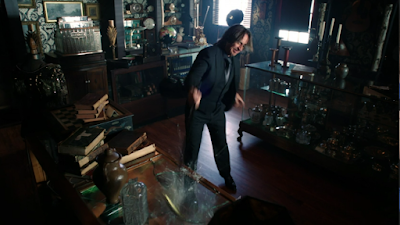Read the previous entry in the series here.
Read the next entry in the series here.
2.2, "We Are Both"
Written by Jane Espenson
Directed by Dean White
Synopsis
 |
| Drawing straws should differ for dwarves. Image taken from the episode, used for commentary. |
In the Enchanted Forest, Regina rides down carefully tended roads, fleeing unsuccessfully from her mother and her magics. Regina is magically constrained to remain in particular proximity to Snow White's father, and she complains to her mother about it.
 |
| Terrible news, indeed: he sells drugs. Image taken from the episode, used for commentary. |
In the Enchanted Forest, Regina tends to an adolescent Snow White, who asks after jewelry she had received from Daniel. Regina imagines rebuking Snow White for her indiscretion again, fatally, and she complains to her father about her mother, Cora, and purposes to flee. He offers such counsel and comfort as he can, and he explains some of the history involved with Cora's turn to magic, citing a book.
Regina calls in at Gold's shop, looking through the books he has on display. He confronts her about her lack of power, chiding her and making to send her away. She notes their shared secret, that the Enchanted Forest remains, and he provides the requested book--and a warning.
 |
| Someone's not a happy camper. Image taken from the episode, used for commentary. |
In the Enchanted Forest, Rumpelstiltskin continues to confer with Regina. He offers to teach her magic, and she demurs. He presents her a portal to another realm, one to which Regina can condemn Cora with but "a little push."
In Storybrooke, Regina opens the book and begins to draw power from it, while David attempts to locate Jefferson via magic. He is drawn through town to a crushed vehicle, from which he extricates Jefferson and missing the meeting. Regina does not miss it, however, and announces the resumption of her power emphatically. Henry volunteers to accompany her if she will leave the rest alone, and the two depart. David confers with Jefferson about his hat, to be met with Jefferson's psychic torment. As David gives chase to a fleeing Jefferson, Ruby interdicts him with news of events and a warning that matters are degrading.
Henry attempts to flee as soon as he arrives at Regina's home, but her magic interdicts him just as she had been interdicted by Cora before. As they confer, Henry upbraids and rebukes Regina for her conduct towards him and others, and Regina tries to woo him with magical power, unsuccessfully.
In the Enchanted Forest, Cora confronts Regina in anticipation of her wedding. They talk together, Cora's words speaking to her machinations. Regina gives Cora the aforementioned push, sending her into the mirror, which shatters.
 |
| Well, this imagery's certainly saying...something. Image taken from the episode, used for commentary. |
Regina rides out again, Rumpelstiltskin confronting her. He asks her about her use of magic, and she confesses having enjoyed doing so. He offers to teach her to use magic, and she agrees to his terms.
 |
| No whistling this time... Image taken from the episode, used for commentary. |
In the Enchanted Forest, Emma and Mary Margaret languish as Aurora and Mulan's prisoners, taken to a rough village. They attempt escape without success and are imprisoned more straitly--where they encounter Cora.
Discussion
I note that the horse upon which Regina flees is named Rocinante--and there's some neomedievalist movement in that. Those who know, or who perform a quick Google search, will find that Rocinante as a horse is a reference to Don Quixote; it is the name of the titular Don's horse, in fact, an underfed and overworked beast that is dragged into the characters delusions of chivalry that derive from excessive reading of romances and books of arms--from what amounts to obsession with the medieval if not an early instantiation of medieval studies. (I am aware of the irony of my pointing this out, given my doctoral work in Malory and my ongoing attention to medieval studies despite being a lapsed or expatriate academic.) Admittedly, de Cervantes is not a medieval writer, though he is a medievalist one, looking back to accounts of the medieval for his inspiration; reference to him is therefore a more explicitly neomedievalist gesture--which is, admittedly, wholly in keeping with how the series operates. It doesn't look back to the medieval, but to later presentations and idealizations of the medieval--although the recourse to de Cervantes is an interesting and unusual move.

No comments:
Post a Comment